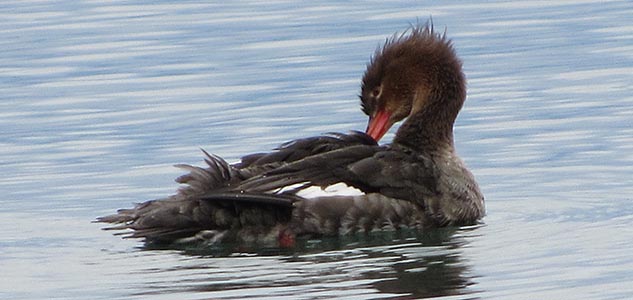Please be vigilant and report suspicious waterfowl deaths
||| FROM RUSSEL BARSH for KWIAHT |||
As the winter southward bird migration gets underway (yes, it’s several weeks later than usual), ducks,
geese and swans are massing on the Skagit River flats, and with them, evidence of a fresh outbreak of
“Highly Pathogenic Avian Influenza” or HPAI, caused by the H5N1 virus.
Meanwhile, there have been a growing number of cases nationwide of H5N1 “jumping” from a bird to a human, including one recently reported near Vancouver, BC. We do not yet know whether H5N1 has evolved the ability to thrive solely within human hosts, separate from birds, but it may now be more a question of “when.” And a question of what kinds of symptoms humans might expect from H5N1 infections, if they spread. Monitoring and research are critical, at this stage.
In the San Juan Islands, you can report dead waterfowl to Kwiaht. We are specially authorized by the
Washington Department of Fish and Wildlife to collect virus samples for testing at the state veterinary
laboratory in Pullman. With biologists based on Orcas, San Juan, and Lopez, we can and must respond
quickly; samples must be collected within 24 hours of death while the virus is still active and intact. To
reach us most quickly, please send an email to: info@kwiaht.org
You may also report dead waterfowl directly to the state Department of Fish and Wildlife online HERE.
If you raise poultry and think you have a bird sicken and die from HPAI this Fall, report it online HERE.
If you raise poultry and think you may have contracted avian flu from your flock, call the Washington
State Department of Health at: 1-800-525-0127.
When you contact Kwiaht about a dead duck, goose, swan or seabird, please give us its location and add
a photo, if possible, so that we can determine if a “live” viral sample can be collected. We will get in
touch about sampling, and if we submit a sample to the state lab, we will share the results with you.
Please treat all dead wild waterfowl as potentially contagious to scavengers and possibly humans, too. Do not handle them, wash up thoroughly with soap and water if you do come into contact, and if you can, cover the dead bird with a sheet, towel, cardboard box – something that will deter scavengers – and if we do not ask to sample it, please shovel soil over the bird, bury it, or double-bag it and dispose of it as solid waste; after a few days, it will probably no longer contain any active viruses.
**If you are reading theOrcasonian for free, thank your fellow islanders. If you would like to support theOrcasonian CLICK HERE to set your modestly-priced, voluntary subscription. Otherwise, no worries; we’re happy to share with you.**







